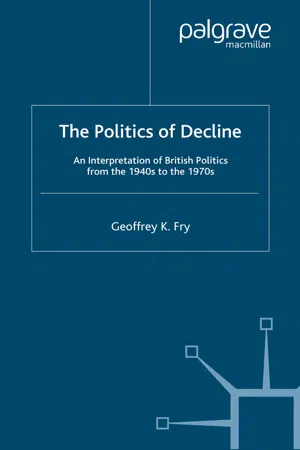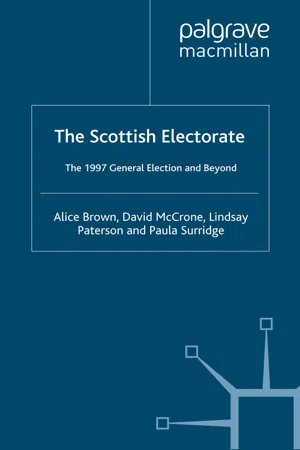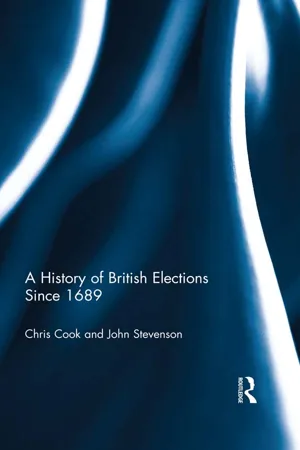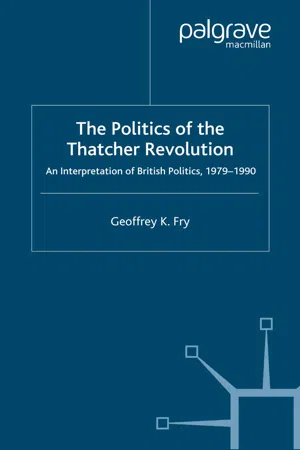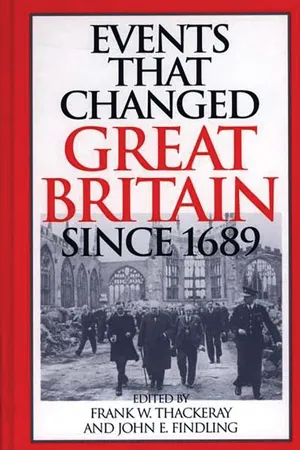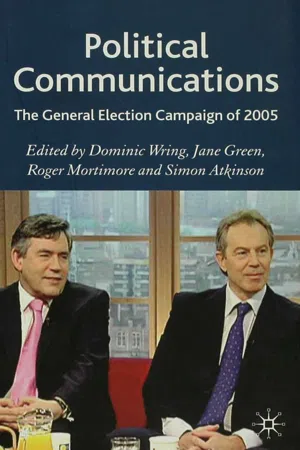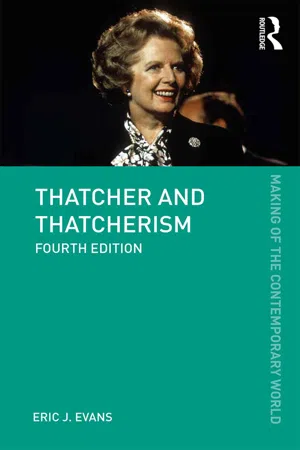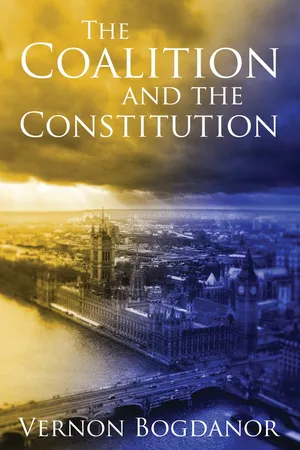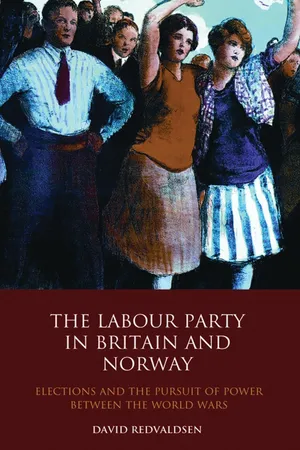History
1983 General Election
The 1983 General Election in the UK saw Margaret Thatcher's Conservative Party win a landslide victory, securing a second term in office. The election was marked by a significant shift to the right in British politics, with the Labour Party's manifesto being dubbed the "longest suicide note in history" due to its left-wing policies. This election solidified Thatcher's position as a dominant political figure.
Written by Perlego with AI-assistance
Related key terms
1 of 5
9 Key excerpts on "1983 General Election"
- eBook - PDF
The Politics of Decline
An Interpretation of British Politics from the 1940s to the 1970s
- G. Fry(Author)
- 2004(Publication Date)
- Palgrave Macmillan(Publisher)
A radical programme was carried through by a Government of giant figures who built a Welfare State, and an economy run for full employment and high and sustainable economic growth on Keynesian lines with its commanding heights in public ownership. That settlement endured until Margaret Thatcher’s counter revolution.’ 20 With 1945 in mind, Lewis Namier wrote afterwards that ‘General Elections are the locks on the stream of British democracy, controlling the flow of the river and its traffic’, 21 which well-known observation invited the response that many of the most important changes in the direction and content of British politics had little to do with General Elections. British Governments had twice declared war on Germany in the twentieth century without recourse to General Elections. It may remain a matter of debate whether the First World War or the Second had the most radical effects on British society, but no other events or ideas changed both Britain’s role in the world as dramatically or the content of its political discourse as importantly as the waging of two total wars. The outcome of the 1945 Election represented ‘the Waterloo of the Conservative Party’, according to the supposedly dispassionate authors of the first ever Nuffield Election Study, 22 who, in effect, gave an affirmative answer to the familiar political question of the day, namely: ‘has Labour come to stay?’ 23 On this view, Labour’s victory in 1945 was ‘the manifestation not simply of a transitory mood at one 38 The Politics of Decline General Election, but of a genuine and cumulative increase over many years of popular support for socialist policies that had been advanced with increasing precision in every phase of the Labour Party’s history. This support did not derive simply from successful advocacy … . It came from the logic of events and the maturing development of cir- cumstance. - eBook - PDF
The Scottish Electorate
The 1997 General Election and Beyond
- A. Brown, D. McCrone, L. Paterson, Paula Surridge(Authors)
- 1998(Publication Date)
- Palgrave Macmillan(Publisher)
26 The Scottish Electorate This chapter outlines the background to the election campaign before assessing the results of the election and the consequences for Scottish and British politics. In Chapter One we identified four key dates in Scottish political history prior to 1997, namely 1832, 1886, 1922 and 1974. Similarly, we can highlight three key general elections in the post-war period: • The election of the Labour government in 1945 committed to developing and expanding the welfare state and to combating unemployment through the use of Keynesian demand management. • The return of a Labour government in 1964 after thirteen years of Conservative rule on a platform of major social reforms. • The election of the first Thatcher government in 1979 promising a radical break with the politics of the so-called post-war consensus and offering a future based on monetarism, the rolling back of the state and the adherence to free market principles. The general election of 1997 promises to go down in history on several grounds, not least because of the number of records broken (Norris, 1997), but also because of the new Labour government's programme of constitutional change. In the first session of Parliament the government outlined its plans to hold referendums on devolution in Scotland and Wales, to hold a referendum on the establishment of a strategic authority for London including the election of a mayor, and to set up regional development agencies in England. Plans for introducing proportional representation for elections to the European Parliament were announced, and a freedom of information White Paper was published. Other proposals for reforming the House of Lords and introducing electoral reform for the House of Commons are being considered. - eBook - ePub
- Chris Cook, John Stevenson(Authors)
- 2014(Publication Date)
- Routledge(Publisher)
For the Liberals themselves, the election was an unmitigated disaster: their representation in Parliament was reduced from nine MPs to six; their plight was surpassed only by that of the Communist Party which received a derisory 0.07 per cent of the poll. Once again, the results could be claimed as a moral victory for both the major parties. The Conservatives had won a majority of parliamentary seats contested; the Labour Party, though defeated, had won more votes than ever before and for the third time since the war had secured more votes in an election than the Conservative Party.The election also marked a period of two-party electoral politics in Britain that was to last until the 1970s. As Table 7.1 shows, from 1951 to 1970 the vote of the two main parties never fell below 87.5 per cent.Table 7.1 Major vs. minor parties’ share of votes and seats, 1951–70Con. and Lab. combined Third and minor parties Year % of total vote % of total vote % of total vote % of total vote 1951 96.8 98.6 3.2 1.4 1955 96.1 98.6 3.9 1.4 1959 93.2 98.9 6.8 1.1 1964 87.5 98.6 12.5 1.4 1966 88.8 97.8 11.2 2.2 1970 89.4 98.1 10.6 1.9 Source: Butler, British General Elections, 79 .Given the strength of the Labour vote from 1945 to 1951, few could have realised that the 1951 election would inaugurate a long period of 13 years of Conservative rule during which Labour suffered serious infighting and the Liberals (at least until the Orpington by-election of 1962) remained on the fringes.The General Election of 1955
The background
The Conservatives entered the 1955 election against a background of many favourable conditions giving them cause for optimism. The resignation of Churchill as prime minister on 6 April 1955, and the succession of Sir Anthony Eden, provided the ideal opportunity to call a snap election against a background of rising living standards, an electioneering Budget and the end of the rationing of the immediate post-war years. Moreover the Conservatives could make much capital out of Nye Bevan’s resignation back in April 1951 – pointing to the (unlikely) scenario of the Bevanites taking control of the Labour Party.Moreover, the by-elections of 1951–55 had indicated popular support for the Conservatives. Not a single one had been lost by the Government since 1951, and South Sunderland had been gained from Labour in 1953. The 1955 municipal elections had produced good results for the Government and the opinion polls showed a majority in favour of continuing Conservative rule. The election campaign was the quietest and most uneventful in recent history. With the Conservative programme United for Peace and Progress - eBook - PDF
The Politics of the Thatcher Revolution
An Interpretation of British Politics 1979 - 1990
- G. Fry(Author)
- 2015(Publication Date)
- Palgrave Macmillan(Publisher)
31 That said, though, the Study observed that since mass suffrage came in, the Conservative lead of 14.8 per cent over the second party obtained in 1983 had been matched only in 1924, 1931 and 1935. 32 While recognizing the contribution made to the success of the Con- servatives in the 1983 Election by the demoralized and divided Opposition that the Tories faced, 33 Bruce-Gardyne, recalling that ‘the mixture of distrust, dismay and even contempt with which [Mrs Thatcher] was regarded in the salons had hardly been diminished by four years’ experience’, gloried in the ‘victory of the backwoods over the bien pensants’. 34 The one thing that could not be said about British politics during the 1983–87 Parliament was that it was uneventful. The IRA came close to mur- dering Mrs Thatcher at the time of the Party Conference in 1984. ‘Jane told me that there had been a huge bomb at Brighton, the hotel had been all but demolished’, Clark wrote in his diary for 12 October 1984, They had ‘got’ [Norman] Tebbit, [John] Wakeham, Tony Berry, various dig- nitaries. Amazing TV coverage. The whole façade of the hotel blown away . Keith Joseph (indestructible), wandering around in a burgundy coloured dressing gown, bleating. The whole scene was one of total confusion, people scurrying hither and thither, barely a police ‘officer’ to be seen. Mrs T had been saved by good fortune (von Stauffenburg’s suitcase!). Had she been in the bedroom she would be dead. But what a coup for the Paddys. The whole thing has a smell of the Tet Offensive. If they had just had the wit to press their advantage, a couple of chaps with guns in 24 The Politics of the Thatcher Revolution the crowd, they could have got the whole Government as they blearily emerged – and the assassins could in all probability have made their getaway unpunished. 35 So, Mrs Thatcher lived on to defeat the year-long strike in the coal-mining industry that the National Union of Mineworkers had launched in March 1984. - eBook - PDF
- Frank W. Thackeray, John E. Findling, Frank W. Thackeray, John E. Findling(Authors)
- 2002(Publication Date)
- Greenwood(Publisher)
In spring 1982 foreign issues unexpectedly grabbed the prime minister's attention when Argentina's military dictatorship seized the Falkland Is- lands, an isolated and underpopulated British possession in the South At- lantic Ocean. In a campaign lasting more than two months, British forces regained the islands at the cost of 255 British lives. Victory in the Falklands helped to rescue Thatcher and the Conserva- tives from increasing unpopularity with the British voters and to set the stage for a Conservative electoral victory in June 1983. Helped also by a fractured Labour Party that had taken a sharp turn to the left, Thatcher and the Conservatives won a 144-seat majority in the House of Commons, a 178 Events That Changed Great Britain margin that encouraged the prime minister to continue her neoconservative initiatives. After purging her cabinet of the remaining wets, Thatcher embarked upon a series of privatization measures designed to turn over economic as- sets held by the British government to individuals and corporations. In other words, Thatcher set out to destroy one of the most important pillars upon which British socialism rested. In 1984 British Telecom was privat- ized; this was soon followed by British Gas (1986), British Airways (1987), and the electricity and water utilities (1990). Thatcher also dealt a heavy blow to the unions. In 1984 the miners, the most unreconstructed, leftist trade union, went on strike. Thatcher met the challenge head on. She refused to compromise—going so far as to call the miners the "enemy within"—and outlasted her opponents in the course of a bitter strike that lasted almost one year and resulted in a complete victory for Thatcher's government. During this period, Prime Minister Thatcher became more prominent on the global scene. Together with her U.S. counterpart, President Reagan, she engaged Mikhail Gorbachev, the new Soviet leader, in a series of discus- sions and meetings that helped put an end to the Cold War. - eBook - PDF
Political Communications
The General Election Campaign of 2005
- D. Wring, J. Green, R. Mortimore, S. Atkinson, D. Wring, J. Green, R. Mortimore, S. Atkinson(Authors)
- 2007(Publication Date)
- Palgrave Macmillan(Publisher)
1 Introduction: General Election Campaign Communication in Perspective Dominic Wring The 2005 General Election will probably be best remembered for result- lng in an unpreeedented third term for a Labour government, albeit on a redueed total of 35.2% of the poll (356 seats, down 56) against the Conservatives' 32.4% (198, up 32), Liberal Demoerats' 22.0% (62, up 10) and others' 10.4% (31, up 3). Despite a modest share of the vote, the party was returned with a eomfortable working majority of 66. The prior eampaign was a somewhat muted affalr when eompared with the mas- sive debate over the Iraq situation that had engaged polltidans, journal- ists and the wider publie two years before. Although this erisis and its aftermath raised serious questions over the government's eonduct, the eeonomy eontinued to remain a strong positive for Labour and helped the party to a further victory. A parallel ean be made with the Conservatives' third eonsecutive win amid the relative affluence of 1959 following another potentlaJly debilitating (Suez) aisis in the Middle East. And like that earlier eampaign the 2005 General Election witnessed some innovative uses of strategie eommunieation and saw the further crystallisation of a trend in favour of targeting key groups of 'floating' voters. Consequently many of the resulting messages were designed for less eommitted seetions of the electorate rather than eore supporters. Labour's difficulties did, however, result in strategists giving greater attention to how the party might re- engage with loyal partisans whose votes it had hitherto appeared to have taken for granted. The impermanent campaign: Labour's second term Labour's seeond parliamentary term in office was very different to it first and marked by serious eontroversies, none more eontroversial than the debate over Tony Blair's decision to support the US led invasion of lraq in - eBook - PDF
- Eric J. Evans(Author)
- 2018(Publication Date)
- Routledge(Publisher)
Labour was split, having lost some of its ablest figures to the newly formed Social Democratic Party (SDP). Worse, they had saddled themselves as leader, in an age when image, appearance and presentation were beginning to matter much more than coherent argument or debating skill, with an inveterately scruffy socialist bibliophile. Surely Michael Foot was unelectable? Thatcher preferred facing him across the despatch box at Prime Minister’s Question Time to the equally intelligent, but much more brutal, Denis Healey. So, although she entered 1982 with the lowest approval ratings of any prime minister since opinion polling began, she was confident of her position despite mounting speculation that a fearful Conservative Party would replace her as leader before the next election. As she also knew, things in politics have a habit of turning up to transform the picture. In 1982, they did. This would be the year when Thatcher discovered popularity to accompany her increasingly formidable sense of destiny. Notes 1 Margaret Thatcher, The Downing Street Years (Harper Collins, London, 1993), pp4–5. 2 Kenneth Harris, Margaret Thatcher (Weidenfeld & Nicolson, London, 1988), p71. 3 J. Campbell, Margaret Thatcher Vol 1: The Grocer’s Daughter (Jonathan Cape, London, 2000), pp415–16. 4 Quoted in Andrew Gamble, The Free Economy and the Strong State: The Politics of Thatcherism (Macmillan, London, 1988), p140. 5 Ian Gilmour, Inside Right (Quartet Books, London, 1977), p96 and p121. 6 Kenneth Harris, Thatcher (Weidenfeld & Nicolson, London, 1988), p82. 7 Quoted in S. Edgell and V. Duke, A Measure of Thatcherism (Harper Collins, London, 1991), p3. 8 Cited in A. Gamble, op. cit. , pv. 9 (ed.) D. Kavanagh, The Politics of the Labour Party (Allen & Unwin, London, 1982), pp9–45. - eBook - PDF
- Vernon Bogdanor(Author)
- 2011(Publication Date)
- Hart Publishing(Publisher)
In 1945, when the Conservatives were so thoroughly beaten by Attlee’s Labour Party, they gained 39.8% of the vote, nearly 4% more than in 2010. The Conservative vote in 2010 was lower than at the time of the last hung parliament in February 1974, when Edward Heath had secured 37.1% of the vote. But the outcome of that election had The General Election of 2010 and the Formation of the Coalition 5 been a Labour minority government. When David Cameron entered Downing Street, it was with the lowest percentage of the vote of any Conservative Prime Minister in modern times. Had the election led to a Conservative minority government, which seemed at one point a likely outcome, it would have been the second successive British gov-ernment to have been based on just over one-third of the vote. Labour, although it enjoyed a comfortable overall majority of 67 seats after the 2005 general elec-tion, had won that majority on just 35.2% of the vote, a smaller share than the Conservatives achieved in 2010. The vagaries of the electoral system allowed Labour, therefore, to secure an overall majority on 35.2% of the vote in 2005, while denying the Conservatives an overall majority on 36.1% of the vote in 2010. All the same, nearly two-thirds of those voting had voted against the Conservatives, just as nearly two-thirds of those voting had voted against the majority Labour government of 2005. These two election results cast perhaps an ironic light on the notion of democracy as majority rule, and on the proposition that the first past the post electoral system generally yields a government supported by the majority of the voters. The Conservative/Liberal Democrat coalition, formed after the elec-tion, does, however, enjoy an overall majority of 78 in the House of Commons, while over 59% of those voting supported either the Conservatives or the Liberal Democrats. - eBook - PDF
The Labour Party in Britain and Norway
Elections and the Pursuit of Power Between the World Wars
- David Redvaldsen(Author)
- 2011(Publication Date)
- I.B. Tauris(Publisher)
4 CONSOLIDATION The Parliamentary Elections of 1935 and 1936 This chapter follows in the mould of the two previous ones. It first gives a short background to the election of 1935 in Britain and 1936 in Norway. Then it examines the state of the two Socialist parties and narrates how they prepared for the elections, before giving more details about how campaigning was carried out. Finance and the electoral materials of each party are then compared. These electoral materials are scoured for appeals to particular groups, which remains a highly prioritized task for this comparison. The chapter ends with information about the outcome of each election and, lastly, there is a conclusion. The British general election of 14 November 1935 is fully described in the book by Tom Stannage. 1 A number of articles have also appeared, detailing various aspects of the contest. 2 The election pitted the National Government, since June 1935 led by Stanley Baldwin, the Conservative leader, against Labour and those Liberals who had left the Government over the free-trade issue in the autumn of 1932. Due to the gathering clouds across Europe, caused by Hitler becoming Chancellor of Germany in January 1933 and Italy’s invasion of Abyssinia in October 1935, it was an election in which rearmament, the League of Nations and collective security were central. The British economy had markedly improved since 1931, but unemployment was still high. Labour wished to abolish the Means Test, which meant that the level of maintenance the unemployed received depended on their family’s circumstances. The record of the National Government was another issue during the campaign of course, as were Labour’s alternative policies of nationalization and peace through negotiation rather than armed might. Probably because Labour was weak going into the election, there were no major scare stories about the party as there had been in 1924 with the Zinoviev letter or in 1931 about the Post Office Savings Bank.
Index pages curate the most relevant extracts from our library of academic textbooks. They’ve been created using an in-house natural language model (NLM), each adding context and meaning to key research topics.
